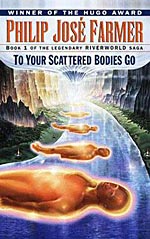
![]() jfrantz
jfrantz
7/17/2012
![]()
Sir Richard Francis Burton died in 1890. He was resurrected along with every other human being that ever lived, hairless and naked in a vast river valley on an unknown planet in an unknown time. Burton eventually bands with an unlikely group which includes a prehistoric Neanderthal, an adolescent girl, and alien from Tau Ceti and a number of others from varying places and times. Armed each with a towel and "grail" (I pictured a metal trash can that provides food and supplies when placed under a mushroom shaped "grailstone"), the group sets out to find out what exactly is going on.
Strange fruit
The best way I can describe this first installment in Farmer's Riverworld Saga is to say that it is ripe. With people from all times and places resurrected in one place, an epic river adventure, mass promiscuity and some gratuitous violence, what could possibly be off limits? Within just four short chapters of beginning this book, the juice of possibility was dripping down my arm like an over-ripe peach.
Leaning heavily on all that is possible, the story eventually develops a good head of steam which culminates in a river battle with a group of slaveholders led by none other than Herman Göring. To that point, there had been something Zelazny-esque about the journey that despite little more than a vague conception of the goal or possible outcome, nonetheless moves forward determinedly and is punctuated by alternating periods of despairing self-examination and then of ultra-violence.
Like Zelazny's Hugo winners, the more that is uncovered along the way, the more questions readers are left with, which creates a kind of slow building and eventually snowballing tension which could have no other outlet than a violence that would have you convinced that real people fought and died. The river battle with Göring's minions is sweaty, bloody, disturbing and represented the high-point in the book for me.
The fruit sours
I found Burton's incessant references to the breasts or beauty of every woman he comes across or his many other brands of bigotry to be rather annoying and it sometimes derailed my full enjoyment of the journey. There is also a lot of attention given to what is generally thought of as pretty sub-par and awkward writing as far as Hugo winners go (io9 said something like "the worst since Fritz Leiber's The Wanderer"). I was less bothered by this than by how muddled Farmer's conception of rights, responsibilities and basic human nature become.
The River begins with an unmistakably Hobbesian view of the human condition as "Nasty, brutish and short" and central authority as the only escape from our "state of nature." It seemed within hours of resurrection, the "lazuri," degenerate into a warlike state that rivals any zombie thriller for its portrayal of nothing short of abject fear of our neighbors. There was actually a time that I thought I'd stumbled upon some sort of satire on social contract theory, but then Burton walks himself through a rationalization for stealing a bow from a stranger that (combined with a few similar experiences) just served to throw a wrench in any cohesive sense of Farmers conception of human nature. I found myself scratching my head more than a few times wondering what could he possibly be trying to say here?
Recommendation
I had a little trouble getting into this one. The Riverworld had such great potential, but I found myself put off by Burton and what struck me as a somewhat confusing world. Add to that the fact that anything the narrative had going for it, comes completely unglued after the group is taken captive and diverges from about 150 pages of steady pacing and leans heavily on haphazardly dumping info on readers. In the end, I guess it is a novel of extremes--of tremendous potential and occasionally supreme disappointment.
http://hugoenduranceproject.blogspot.com/2012/07/to-your-scattered-bodies-go.html